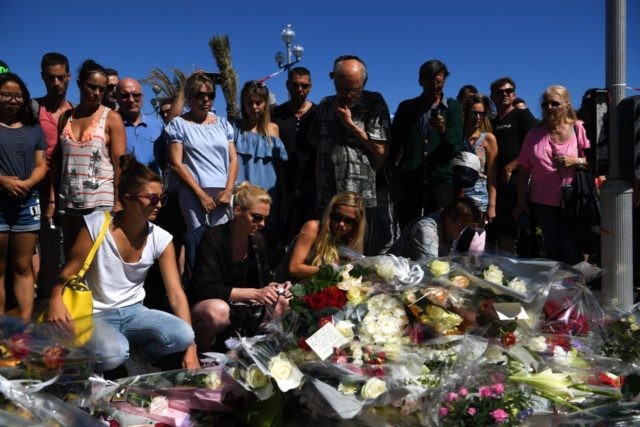This is the moment a Sky News correspondent asked a human rights activist whether she could explain the “sense of the disenfranchisement” that North African communities feel in France, as a means to explaining the terrorist attack in Nice last night which claimed the lives of 84 men, women and children.
Speaking to Samia Hathroubi, a French-Tunisian human rights activist, regarding the attack earlier this afternoon, one Sky News correspondent asked: “Could you just give us a sense of the disenfranchisement that the north African community sometimes feel, especially young males within that community?”
Hathroubi responded that, although there is ghettoization and discrimination against Northern African communities in Paris and Nice, “I don’t think this is …the only reason” for terrorism.
“The sociological reasons are not the only ones to be on the table,” she added, explaining that no-one really understands the process by which people are radicalised.
It was clear therefore that Hathroubi would not provide the narrative Sky wanted, but two hours later they had more success, interviewing Dr. Joseph Downing, a London School of Economics academic specialising in French politics and minority populations, who obligingly told Sky News that he believed the attack had nothing to do with Islam, but was merely the act of a mentally troubled man.
Although he too held back from blaming radicalism purely on socio-economic reasons, Dr Downing went a step further, insisting that there was in fact no common thread between people who turn to terrorism.
“It’s important to emphasise that not everybody living in these communities turns to terror attacks or becomes radicalised,” Dr Downing said.
“I am not a fan of an over sociological explanation for these kinds of attacks because there are so many people who are socio-economically disenfranchised in France of a Muslim background who do not get engaged in any way or support in any way any terrorist network. The numbers of people that we are talking about [who do] are ridiculously small, far less than even one percent.
“My personal explanation for this – as we have seen with some of the reports that have come out about this individual today – is that these are the acts of mentally disturbed people, possibly.
“The individual today, there’s speculation that perhaps his motivations for conducting this attack had nothing to do with an ideological commitment to terrorism, but perhaps because he was in the middle of some sort of emotional distress over his wife leaving him.”
In line with a number of previous terrorists, the perpetrator of last night’s attack, Mohamed Lahouaiej Bouhlel has been revealed to have had a history of violent crime, including armed robbery. But this too is dismissed as a possible cause of radicalisation.
“I think these explanations [of mental health problems] we need to take seriously because clearly we can’t easily say ‘it’s people who are involved in crime that end up committing terror attacks.’ That that’s a common thread we can see between all individuals involved in terror attacks in France in the past five or so years, yet there are loads of petty criminals who don’t become terrorists.”
Meanwhile Pascal Grierson, CEO of French Radio London, has told the channel that France and also Belgium have “taken the brunt” of Islamic terrorism in Europe as they are two countries who have “banned the Islamic veil — the veil of course, hugely symbolic of the Islamic faith.”
Elsewhere, others were willing to pin the blame for Islamic terrorism on poverty and disaffection.
As news broke of the attack on Thursday night, Robert Baer, a former CIA operative, told CNN’s Don Lemon “You have a very large disaffected North African community. They are French citizens now … but they’ve been excluded from French society.
“I went to school in France … I worked there and they are really totally excluded,” Baer added.
Not only are the community disaffected, but Baer believes that the response to terrorism is helping to create more terrorists.
“It keeps getting worse since the attacks in Paris because [police] are using profiling and they are stopping people who look like Arabs on trains and buses, checking their IDs, which we don’t even do in this country. The French have been very aggressive … radicalization of people of North African origin is actually picking up rather than lessening.”
Meanwhile Lemon’s CNN colleague, Christiane Amanpour, has also been keen to point to the disenfranchisement of France’s Muslim population as a cause for terrorism.
Blogging on the subject today, Ms Amanpour opined “I do not believe this is about terrorists attacking ‘our way of life, our values, our freedoms,’ which Western leaders say as they vow to continue the fight against terrorism. While they lash out at us, they kill many more of their own.”
Instead, she believed it to be the work of Islamic State – “a totalitarian movement that wants to dominate Muslims and anyone else.” So far no definitive links have been found between Lahouaiej Bouhlel and Islamic State.
Little wonder, perhaps, that the French Prime Minister warned today: “Times have changed and we should learn to live with terrorism. We have to show solidarity and collective calm.”

COMMENTS
Please let us know if you're having issues with commenting.